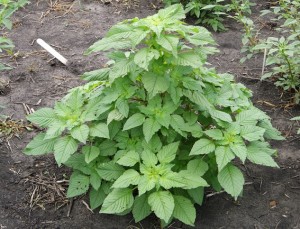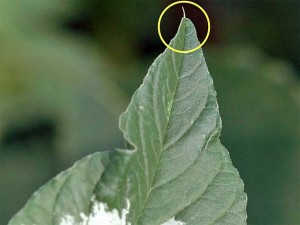
Palmer amaranth has been described as the “perfect weed” and “pigweed on steroids.” Its cluster of key survival traits seem to use almost every weed trick in the book, helping it evade management and thrive under most standard weed control regimens. Because of its development of herbicide resistance traits, it has become a major threat in many states. Glyphosate (sold under the brand name Roundup) is the only chemical that can control it in cotton fields without harming the crop. Palmer amaranth was first reported in Macon, GA in 2005, and is now in at least 25 states.
The most virulent and aggressive of the pigweed family of weeds, palmer amaranth is a summer annual. It has become a threat over the last few decades both because of this aggressive and competitive nature, and because of its herbicide resistance abilities. Because Palmer amaranth has evolved resistance to glyphosate, it requires growers to deploy most of the other tools in their weed management arsenal against this one species alone.
Palmer amaranth is commonly found on dairy farms, imported in feed concentrate like cottonseed hulls, and manure that then contains the seeds is spread across the fields.
Weed Strategies
What makes it such a powerful weed? It has many survival mechanisms that let it easily outsmart the standard weed control tactics, such as –
- Its seed production rate. One female plant can produce over 1 million seeds. The seeds are relatively short-lived in the soil, but that fact is outweighed by the overwhelming seed production rate. The small seeds are easily spread by farm equipment, wind, and manure. The herbicide resistant traits can be spread through both the pollen and the seed, and pollen can travel about 160 feet with just a gentle breeze. Even if only one in a million or a billion seeds contain the herbicide resistance trait, it can quickly become a dominant trait under the conditions of both the selection pressure and the high fecundity of the weed.
- Its germination. It germinates late for a summer annual weed, and many of the seeds germinate thereafter throughout the season, making targeted weed control difficult. It also has higher germination rates than other Amaranthus species at both low and high temperatures.
- It’s water-use efficient, growing happily in extreme heat and drought, when most crops slow down or go dormant.
- Its competitive growth habit. It grows up to three inches a day, often shooting up through any canopy or early advantage created by its host crop, and reaching 6-8 feet tall, sometimes more. A very competitive host crop can be effective though, since Palmer Amaranth does not like shade and will be discouraged by a dense overstory of growth.
- It’s difficult to identify. It closely resembles its less aggressive relatives, especially waterhemp. It can also hybridize with waterhemp, making it particularly difficult to distinguish the two. There are a few key distinguishing features, but anyone suspecting Palmer Amaranth infestation should contact their local extension office right away, so it can be controlled before it becomes established.
- Genetic diversity. The species contains both male and female plants, which means a greater chance of developing and propagating a genetic mutation for herbicide resistance. More genetic diversity means greater adaptability.
- It’s firmly rooted. Once established, it’s difficult to pull up and tolerates both tillage and no-till. The stalk can get up to six inches thick in diameter.
Prevention and Containment

The main enabler of this superweed has been the overreliance on glyphosate in recent years. Before this, a broader variety of more crop-specific chemicals were used. Glyphosate-resistant plants reproduced, creating a large subpopulation that was unaffected by the herbicide. Palmer amaranth will be more a problem in broadleaf crops like soybeans and cotton. In corn, an atrazine or dicamba-based program can be effective.
One of the best defenses is to add as much variety to the rotation as possible. Vary the herbicides used and their modes of action. Rotate the field into an entirely different crop, such as a perennial pasture. The important message is to reduce selection pressure on the weed – the concentrated pressure we put on it through a single control tactic that helps the weed select for the resistant gene expression. By overusing glyphosate, we actually favor the most virulent individuals as they evolve resistance. This is a common theme in human attempts to keep other species at bay, with examples that include antibiotic resistant microbes and pesticide-resistant insects.
Prepare a clean seedbed before planting, using an herbicide burndown or full tillage. Both a pre-emergent and post-emergent herbicides will be essential for the conventional grower. Full rates and tank mixes of residual pre-emergent herbicides are recommended. Palmer Amaranth won’t respond to herbicides after it reaches 4 inches tall. At this point – prior to planting – tillage will be needed.
If there is an infestation, do everything possible to contain it, especially physical removal of the plants from the field before seed production. Use a zero threshold of tolerance. According to the University of Illinois, “a few surviving plants can produce enough seed to completely shift the weed spectrum in a field in less than five years.”
Clean harvest machines, as they could spread resistant seed. Be sure to eradicate any Palmer amaranth from non-production areas where they might grow unchecked, such as along ditches, canals, fence lines, farm roads, etc. Use a burndown herbicide, propane, mechanical means, or whatever works best.
Identification can be a challenge if you aren’t used to scouting for it, but you will generally want to look for rounded leaves in a dense cluster that is poinsettia-like. The stem is smooth and hairless and there is a single short hair at the tip of each leaf blade.
The necessity and the challenge here will be to relearn whole-system weed management, knowledge that began to fade with the over reliance on herbicide-resistant technology.
If you need detailed help with identification or questions about which herbicides to use, contact your local extension office.
Speak to an expert at King’s AgriSeeds now at 1-717-687-6224 or email us at [email protected].
